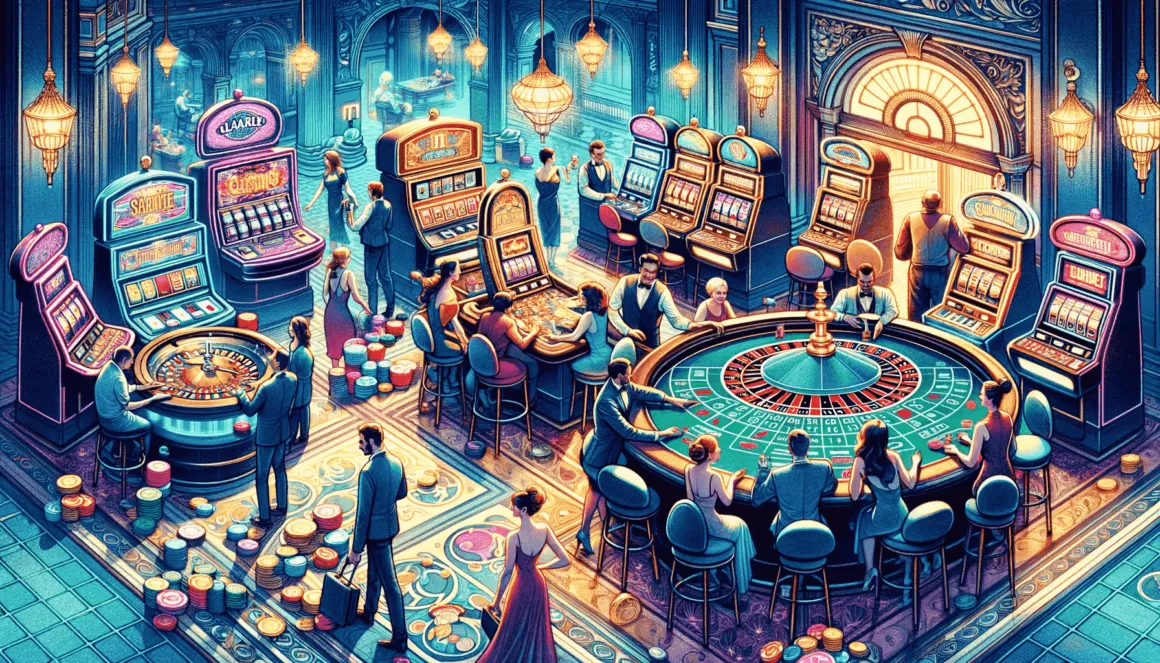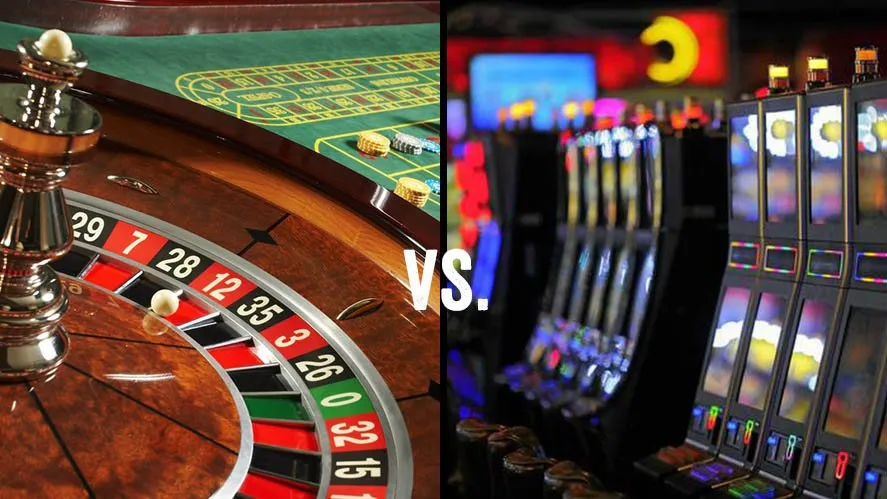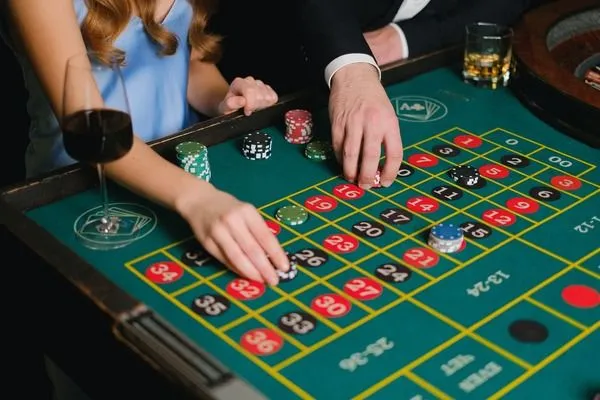
When it comes to casino games, there are plenty of options to choose from. Two popular choices are roulette and slots. Both offer unique gameplay experiences and the chance to win big. But which one should you choose? In this article, we’ll compare roulette and slots to help you decide which game is right for you.
Roulette and slots are both based on chance, but their mechanics and strategies differ greatly. Roulette is a classic table game that originated in France in the 18th century. It involves a spinning wheel with numbered pockets and a small ball. Players bet on where they think the ball will land, and if they guess correctly, they win. On the other hand, slots are electronic machines that use a random number generator (RNG) to determine the outcome of each spin. Players place bets on different symbols or combinations, and if they match, they win.
Both games have their own unique appeal and attract different types of players. Some prefer the fast-paced action of slots, while others enjoy the strategy and social aspect of roulette. So, let’s delve deeper into the world of roulette and slots and see which game comes out on top.

The History of Roulette and Slots
Before we dive into the differences between roulette and slots, let’s take a brief look at their histories.
Roulette
As mentioned earlier, roulette was created in France in the 18th century. The first version of the game was played with a wheel featuring just 36 numbers, plus a single zero pocket. This gave the house an edge, as players had a lower chance of winning when the ball landed on the zero.
In the mid-19th century, the game gained popularity in Europe and quickly spread to America. The addition of a double zero pocket on the wheel increased the house edge even further, making it more difficult for players to win. This version, known as American roulette, is still the most popular in the United States.
In the late 19th century, a German entrepreneur named Charles Fey invented the first slot machine. It featured three reels and five symbols – diamonds, spades, hearts, horseshoes, and a Liberty Bell. The machine quickly gained popularity, and soon, other manufacturers started creating their own versions. By the early 20th century, slots were a common sight in bars and saloons across America.
Gameplay and Mechanics
Roulette
Roulette’s gameplay is simple yet captivating. Players place bets on a table layout with different betting options, such as numbers, colors, or groups of numbers. Once all bets are placed, the dealer spins the wheel in one direction and rolls the ball in the opposite direction. When the ball loses momentum, it will land in one of the numbered pockets, determining the winning bet.
There are two main types of roulette: European and American. European roulette has a single zero pocket, while American roulette has both a single and double zero pocket. This difference may seem small, but it has a significant impact on the house edge. In European roulette, the house edge is 2.7%, while in American roulette, it jumps to 5.26%. This means that players have a higher chance of winning in European roulette.
Slots
Slots, on the other hand, have a more straightforward gameplay mechanic. Players insert coins or credits into the machine, choose their bet size and number of paylines (if available), and then spin the reels. A random number generator determines the outcome of each spin, so there is no way for players to predict the results.
Modern slots come in a variety of themes, with different symbols and bonus features to keep players entertained. They also offer different bet sizes, making them accessible to players of all budgets. Some slots also have progressive jackpots, where a small portion of each bet goes towards the jackpot, giving players the chance to win life-changing amounts of money.
Strategy and Odds
Roulette
One of the main draws of roulette is the ability for players to use strategies to improve their odds of winning. However, it’s important to note that no strategy can guarantee a win in roulette. The outcome of each spin is entirely random, so strategies can only help players make more informed bets.
Some popular strategies used in roulette include the Martingale system, where players double their bet after every loss, and the Fibonacci sequence, where players increase their bet according to a specific sequence. These strategies aim to recoup losses by increasing bets when losing and decreasing them when winning. However, they do not change the house edge, which remains the same regardless of the strategy used.
In terms of odds, European roulette has better odds than American roulette due to the single zero pocket. However, the payouts for different bets vary, with straight-up bets (betting on a single number) having the highest payout but the lowest odds.
Slots
When it comes to slots, there is no strategy that can improve a player’s chances of winning. This is because each spin is determined by an RNG, making it impossible to predict the outcome. Some players may believe that certain patterns or lucky machines can increase their chances of winning, but this is simply not true.
Slots also have varying odds depending on the game and its paytable. Generally, slots with higher bet denominations and fewer paylines have better odds, as they tend to have higher payout percentages. However, this does not guarantee a win, as each spin is still completely random.
Social Aspect
Roulette
Roulette offers a more social experience compared to slots. Players can interact with each other at the table, cheering on wins and commiserating losses. The dealer also adds to the social aspect, as they are responsible for spinning the wheel and managing the bets.
In land-based casinos, roulette tables tend to have a higher minimum bet than slots, making it a more exclusive game. This can create a sense of camaraderie among players, as they are all betting on the same outcomes.
Slots
While there may be a few exceptions, slots are generally a solitary game. In land-based casinos, each player has their own machine, and there isn’t much interaction between players. In online casinos, this is even more apparent, as players are playing from the comfort of their own homes.
However, some online casinos now offer live dealer slots, where players can interact with the dealer and other players in real-time. This adds a social element to the game, but it’s still not as prevalent as in roulette.
House Edge and Payouts

Roulette
As mentioned earlier, the house edge in roulette varies depending on the type of roulette being played. European roulette has a lower house edge of 2.7%, while American roulette has a higher house edge of 5.26%. This is due to the extra double zero pocket, which gives the casino an even bigger advantage over players.
In terms of payouts, roulette offers varying odds and payouts depending on the bet made. For example, a straight-up bet has odds of 37 to 1, with a payout of 35 to 1. On the other hand, a red or black bet has odds of 1.11 to 1, with a payout of 1 to 1. This means that the higher the payout, the lower the odds of winning.
Slots
Unlike roulette, slots do not have a fixed house edge. They use a payout percentage instead, which is the percentage of bets that are paid out as winnings. On average, most slots have a payout percentage of around 95%, but this can vary greatly depending on the game and the casino.
In terms of payouts, slots offer a variety of options, with some games having high-paying symbols that offer big wins. However, most slots have lower payouts compared to roulette, as they are designed to give the casino a larger advantage over players in the long run.
Convenience and Accessibility

Roulette
Roulette is a popular choice in land-based casinos, where players can find multiple tables and variations of the game. This makes it easy for players to jump from one table to another, trying their luck with different strategies and bets.
However, roulette may not be as accessible for those who prefer online casinos. While the game can still be found in most online casinos, it may not have the same social aspect and atmosphere as playing in a physical casino.
Slots
Slots, on the other hand, are readily available in both land-based and online casinos. They are also easily accessible, making them a convenient option for players who want to play on-the-go. With the rise of mobile gaming, players can now enjoy their favorite slots anytime, anywhere.
Online slots also offer a wider variety of games, themes, and bet sizes compared to land-based casinos. This gives players more options to choose from and ensures that they never get bored.
Conclusion: Which Game Should You Choose?
Choosing between roulette and slots ultimately depends on personal preference. If you enjoy a more social experience and the opportunity to use strategies to improve your odds, roulette may be the game for you. On the other hand, if you prefer fast-paced gameplay and the chance to win big with lower bets, then slots may be a better option.
Both roulette and slots offer unique gameplay experiences and the chance to win real money. Whichever game you choose, always remember to gamble responsibly and have fun!


